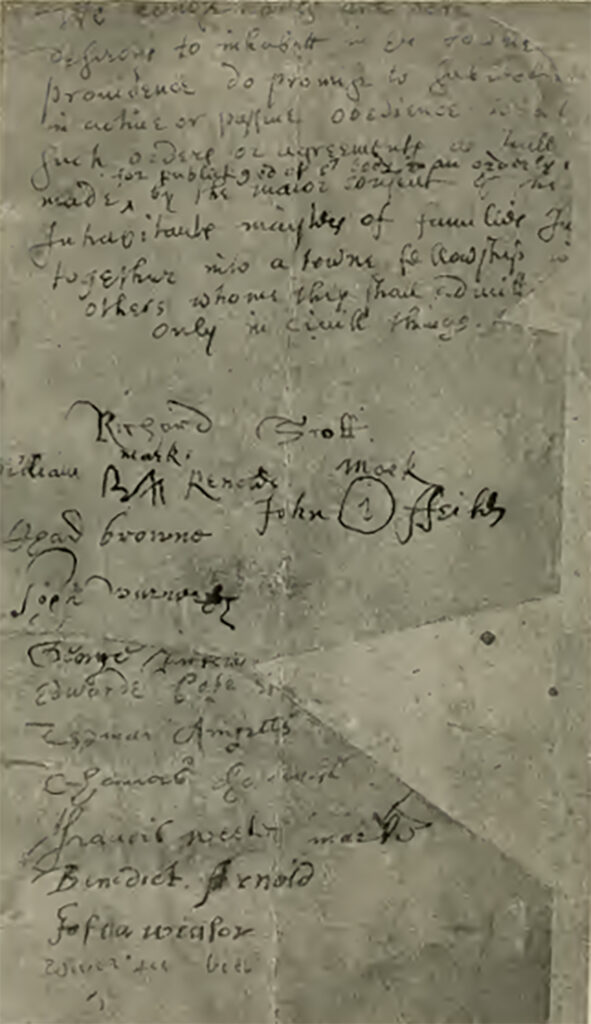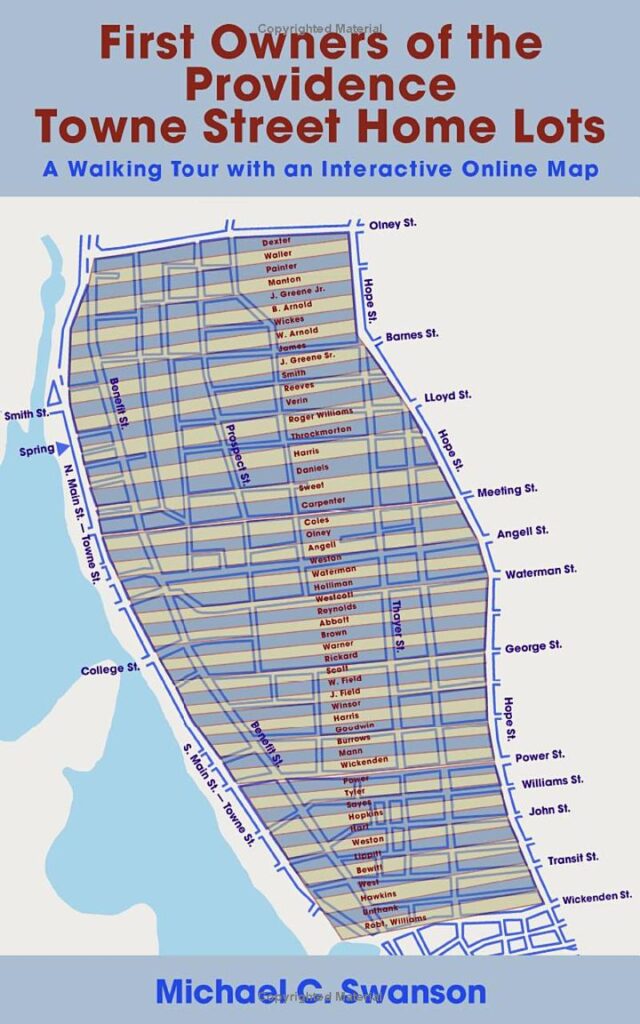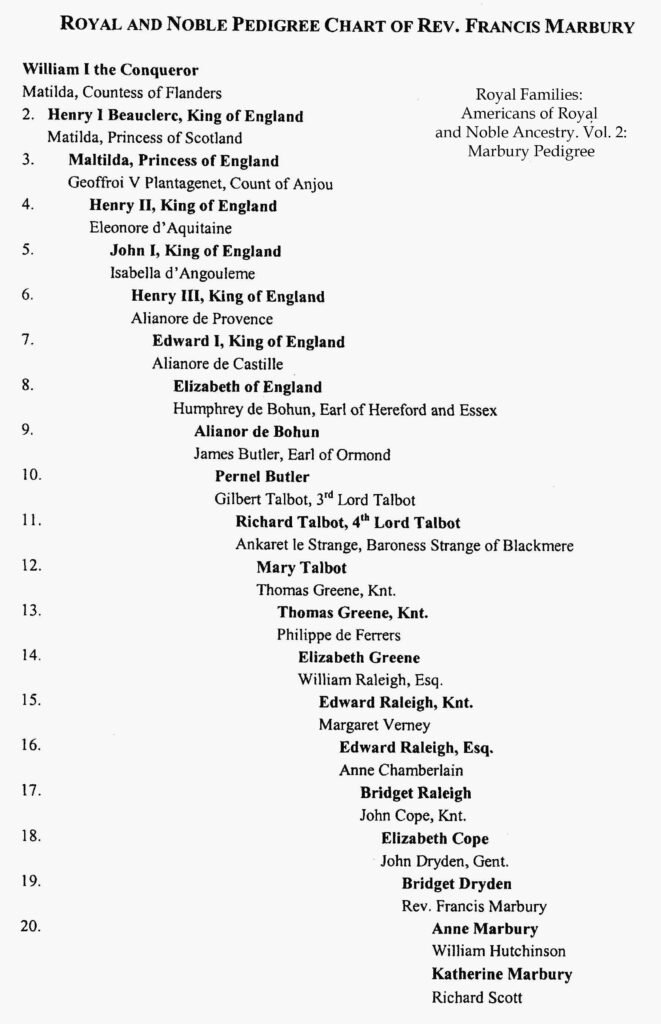Roger Williams is famously given credit for establishing the first English settlement in Rhode Island. But, according to the 1906 book Richard Scott and His Wife Catharine Marbury by Stephen F. Peckham, it was Scott who created the first settlement in what is now Lonsdale, Rhode Island, on the Blackstone River.
Rev. William Blackstone (see the “Anne Marbury Hutchinson Part 1: King James, John Cotton, William Laud, and William Blackstone” post) was likely the first to build a home in the area, thus everything in that area seems to be named for him, but Scott brought a group. The Natives called the area Moshasuck.
If you are ever in the Lonsdale area and would like to know the vicinity of the settlement, just look for Scott Pond. Drive down Lonsdale Avenue and it’s hard to miss. Also, Richard Scott purchased the property of William Blackstone upon his passing, but since Blackstone was the pioneer, it seems everything in that neck of the woods, except Scott Pond, is named Blackstone this or Blackstone that. Not jealous, just saying.
The group of Moshasuck settlers previously mentioned were Richard Scott, Thomas Arnold, Thomas Harris, Christopher Smith, their families and servants. Thomas Arnold was the brother of the famously named Benedict Arnold, though this Benedict Arnold (later Governor Arnold) is of course the ancestor of the Revolutionary War’s turncoat Benedict Arnold.
Richard Scott’s wife, Catherine, was the daughter of English playwright Rev. Francis Marbury and the youngest sister of Ann Hutchinson. Her mother Bridget Dryden was of a noble family who could trace their heritage all the way back to Charlemagne (Richard and Catherine, Francis and Bridget are my wife’s 10th and 11th Great-grandparents).
BTW, just this morning I’m listening to the audiobook The Time Traveler’s Guide to Restoration Britain by Ian Mortimer (all the Time Traveller’s Guides are highly recommended). Mortimer quotes John Dryden, historic British satirist, playwright, Poet Laureate and Historiographer to King Charles II. John’s grandfather Sir Erasmus Dryden was the brother of Bridget Dryden.
Sir Erasmus was an MP and the 1st Baronet of Canons Ashby during the reign of Queen Elizabeth I and onward. He was imprisoned by King Charles I for taking a stand against the Forced Loan which we have discussed in a previous post. He is also a direct ancestor of the late Diana Spencer, Princess of Wales, and of course ancestor of half-brothers Harry and William (just kidding… or am I?).

Rev. Marbury was often persecuted for his nonconformist beliefs while Catherine was a child, and the apple had not fallen far from the tree. Catherine had Anabaptist leanings, which could get you killed in parts of Europe. Even Martin Luther, the founder of the Protestant Reformation, called for the execution of Anabaptists (who generally held anarchist political views).
For reasons such as Catherine’s refusal to join the Church of Boston, the Scott’s had not found themselves welcome in Boston, despite their wealth. They decided to move to the Agawam area, later renamed Ipswich, that previous visitor and soldier-of-fortune Captain John Smith referred to as “an excellent habitation” (and yes, we are speaking of John Smith of Jamestown and Disney’s Pocahontas fame).

Living in Ipswich among strict Puritans the likes of John Winthrop Jr., son of the Governor, and Rev. Nathaniel Ward, who literally wrote the book on puritanical intolerance, must have driven the Scott’s to establish a place of their own. Their young son had also died, so perhaps it was just time for a change. Either way, the Moshasuck community would later be a hub of Quaker activity.

When the wicked smart Anne Hutchinson was arrested, Richard and Catherine came to her defense. Anyone else who defended Anne was legally banished or at least pushed out of Boston after the trial. Richard and Catherine were not part of the Massachusetts Bay Colony, so they were like, “In the words of former Boston Celtics point guard Scary Terry Rozier, ‘I don’t give a —- what nobody say’ ” (paraphrasing).
Anyway, following the trial Richard Scott received a home plot from Roger Williams in the new settlement of Providence. Though Richard was first to sign the Providence Compact, he and Williams would later join the frenemy club (a common theme then, as now) due to Williams’ hatred of Quakers.

BTW, I received a booklet from Amazon yesterday that I recommend to anyone interested in our current subject. It is called the First Owners of the Providence Towne Street Home Lots by Michael C. Swanson. Self described as a “walking tour” of home locations with biographies of the earliest settlers of Providence. Only 52 pages, but power packed and dirt cheap. Highly recommended!

Another Quaker missionary arrived in New England on the ship Speedwell (famously part of the Pilgrim story). His name was Christopher Holder.
Arriving in Boston, as had previously happened with brave Mary Fisher (see The Quakening, Part 1), the authorities arrested Holder and his entire party. They confiscated their books and belongings, had them whipped, etc. and when the SpeedwellI was set to sail once more, they shipped them straight back to England.
Oh and when I say “etcetera”, I forgot to mention in Part 1, the authorities stripped Mary Fisher naked and thoroughly searched her body for signs she was a witch (third nipples and the like). All very “by-the-book” I am sure. I’m also sure they did this with every female Quaker missionary they encountered, or at least the ones they wanted to see naked.

Not to be deterred, young Holder sought another captain to ferry them to New England. The shrewd authorities of Boston, quite sure the Quaker missionaries would keep coming, tried another tack. They passed a law that would cost a ship’s captain 5 pounds per Quaker book or tract and a huge fine of 100 pounds per Quaker delivered to Massachusetts.
It didn’t matter how willing the Seekers were to face the dangers of New England if there were no captains to get them there. Holder was stuck.
To be continued in the Quakening, Part 3…
Below is the Pedigree from ancestor William the Conqueror to Anne Marbury Hutchinson and Catherine Marbury Scott through their mother Bridget Dryden:
